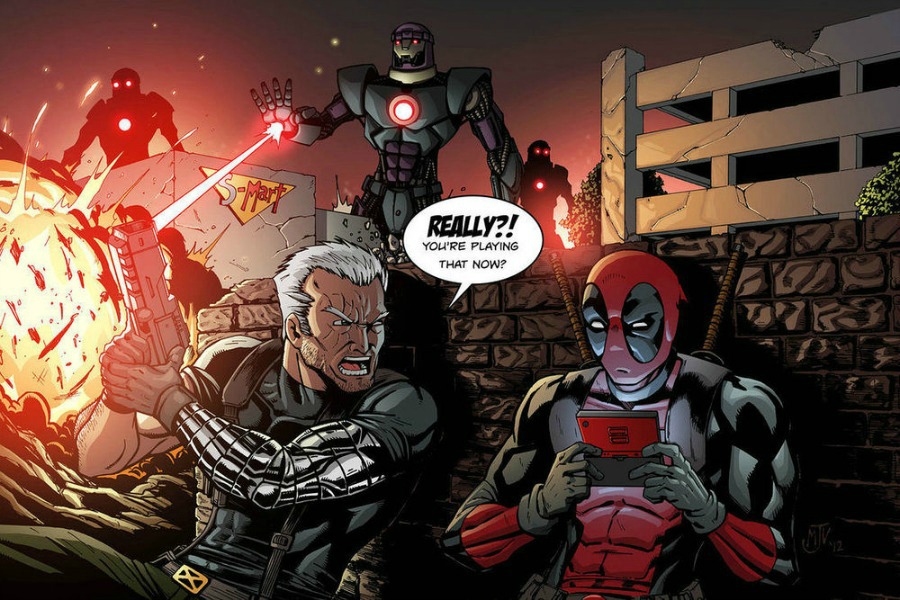Best of the Week: 'Deadpool' is a Monumental Hit, 'Star Wars' Teases 'Episode VIII' and More
The Important News
Box Office: Deadpool broke the record for highest-grossing R-rated movie. And it broke a bunch of other records.
Marvel Madness: Disney dropped the first look at Guardians of the Galaxy Vol. 2. Adam McKay will be involved with Ant-Man and the Wasp in some capacity.
DC Delirium: Dan Amboyer might be the new Green Lantern.
Franchise Fever: The sixth Transformers movie will be a Bumblebee spinoff.
Sequelitis: Another Hellraiser movie is on the way. Blade Runner 2‘s release date was announced. John Wick: Chapter Two‘s release date was announced. Dwayne Johnson will return for a San Andreas sequel. Roger Corman is making a Death Race 2000 sequel. Emily Blunt is the new Mary Poppins.
New Directors/New Films: The Witch‘s Robert Eggers will make a medieval epic next. Ron Howard will direct Robert Downey Jr.’s Pinocchio movie.
Casting Net: Ryan Reynolds will star in a sci-fi movie from the Deadpool writers. Keira Knightley will play Catherine the Great for director Barbra Streisand. Christian Bale will reunite with Scott Cooper for Hostiles. Emilia Clarke will star in Set It Up. Jessica Chastain will star in Aaron Sorkin’s Molly’s Game. Abbey Lee will star in The Dark Tower.
Villainous Ventures: Eric Johnson will play Christian Grey’s rival in the Fifty Shades sequels. Julianne Moore will play the villain in Kingsman 2.
Actor Pairings: Paul Rudd and Steve Coogan will play a couple in An Ideal Home.
Remake Report: Todd McFarlane finished the script for a new Spawn movie. A new Astro Boy movie is in the works. The movie of Stephen King’s It will be rated R.
Reel TV: Salt is being turned into a TV show. The Stand will not be done as a TV series again.
TV Movies: The cast of Good Times is trying to Kickstart a Good Times movie.
The Videos and Geek Stuff
New Movie Trailers: Star Wars: Episode VIII, Ghostbusters, The Divergent Series: Allegiant, Kindergarten Cop 2, Alice Through the Looking Glass, Bastille Day, Crouching Tiger Hidden Dragon: Sword of Destiny, Midnight Special, Sing, Triple 9 and Florence Foster Jenkins.
TV Spots: 10 Cloverfield Lane.
Watch: A fan-made Wonder Woman trailer.
See: What the villain in the new Ghostbusters looks like.
Watch: The first episode of Lego Star Wars: The Resistance Rises.
See: What a Back to the Future prequel would look like.
Watch: Puppets reenact scenes from the Best Picture Oscar nominees.
Play: A video game where Leonardo DiCaprio chases after an Oscar.
See: How Deadpool’s Tim Miller also helped make Iron Man a hit. And the Justice League short that got Miller the Deadpool gig.
Watch: Ryan Reynolds interviews Hugh Jackman about Eddie the Eagle. And James Corden auditions to be Deadpool’s sidekick.
See: What Keira Knightley would look like as Cable in Deadpool 2.
Watch: How the scores for Deadpool and The Hateful Eight were made.
See: How The Good Dinosaur should have ended.
Watch: A scary car commercial directed by Sam Raimi.
Learn: Why Gene Hackman dropped out of The Silence of the Lambs.
Watch: Shia LaBeouf’s latest performance art project.
See: The new motion poster for the Pete’s Dragon remake.
Our Features
Superhero Movie Guides: Upcoming superhero movies that could be rated R. And R-rated comic books that need to be R-rated movies. And how Deadpool could lead a new R-rated comic book movie renaissance.
Sci-Fi Movie Guide: An exploration of recent sci-fi movie sequels.
List: Great romantic movies for people who hate romantic movies.
Horror Movie Guide: All the latest horror news and trailers you need to know.
List: Unexpected appearances by presidents in movies.
Home Viewing: Here’s our guide to everything hitting VOD this week.
and
MORE FROM AROUND THE WEB:
This entry passed through the Full-Text RSS service – if this is your content and you’re reading it on someone else’s site, please read the FAQ at fivefilters.org/content-only/faq.php#publishers.




